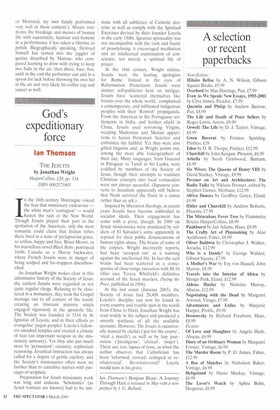God's expeditionary force
Ian Thomson
THE JESUITS by Jonathan Wright HarperCollins,120, pp. 334, ISBN 0002571803 1 n the 16th century Montaigne voiced the fear that missionary endeavour the white man's 'contagion' would hasten the ruin of the New World. Though Jesuits played their part in the spoliation of the Americas, only the most romantic could claim that Indian tribes there lived in a state of prelapsarian grace, so artless, happy and free. Brian Moore, in his marvellous novel Black Robe, portrayed 1640s Canada as a Huron backwater, where French Jesuits were in danger of being scalped and fur-trappers disembowelled.
As Jonathan Wright makes clear in this informative history of the Society of Jesus, the earliest Jesuits were regarded as not quite regular clergy. Refusing to be cloistered in a monastery, they took the Gospel message out to all corners of the world, creating an itinerant ministry which engaged vigorously in the apostolic life. The Society was founded in 1534 by St Ignatius of Loyola, and in their efforts to evangelise 'pagan peoples' Loyola's followers smashed temples and created a climate of fear (an important weapon in the missionary armoury). Yet they also put much store by 'persuasion': casuistry, sophistical reasoning. Jesuitical instruction has always called for a degree of gentle cajolery, and the Society's missionaries often went no further than to catechise natives with passages of scripture.
Preparation for Jesuit missionary work was long and arduous. 'Scholastics' (as Jesuit trainees are known) had to be inti mate with all subtleties of Catholic doctrine as well as comply with the Spiritual Exercises devised by their founder Loyola in the early 1500s. Ignatian spirituality was not incompatible with the rush and bustle of proselytising; it encouraged meditation and an intellectual examination of conscience, not merely a spiritual life of prayer.
In the 16th century, Wright relates. Jesuits were the leading apologists for Rome. Indeed in the eyes of Reformation Protestants Jesuits were sinister self-publicists bent on intrigue. Jesuits have 'scattered themselves like locusts over the whole world,' complained a contemporary, and infiltrated indigenous peoples with their `Romish' propaganda. From the Americas to the Portuguese settlements in India, and further afield in China, Jesuits used sorrowing Virgins, weeping Madonnas and Marian apparitions to harass Protestant 'heretics' and embolden the faithful. Yet they were also gifted linguists and, as Wright points out, among the most able lexicographers of their day. Many languages, from Guarani in Paraguay to Tamil in Sri Lanka, were codified by members of the Society of Jesus, though their attempts to translate Christian concepts into local vernaculars were not always succesful. (Japanese converts to Jesuitism apparently still believe that Noah survived the flood in a canoe rather than an ark.)
Inspired by liberation theology, in recent years Jesuits have become embroiled in socialist ideals. Their engagement has come with a price, though. In 1989 six Jesuit missionaries were murdered by soldiers of El Salvador's army apparently in reprisal for their public denunciations of human rights abuse. The brains of some of the corpses, Wright incorrectly reports, had been 'scooped out' as a warning against the intellectual life. In fact the said brains had been scattered as a consequence of close-range execution with M-16 rifles (see Teresa Whitfield's definitive account of the Jesuit murders, Paying the Price, published in 1994).
At the last count (January 2003), the Society of Jesus had 20,408 members. Loyola's disciples can now be found in every country and trouble spot in the world from China to Haiti. Jonathan Wright has read widely in the subject and produced a smooth synthesis of all the available accounts. However, The Jesuits is occasionally marred by clichés ('par for the course', `steal a march') as well as by lazy journalese ('prestigious', 'clinical', `major). There are, too, lapses of taste, as when the author observes that Catholicism has been 'reformed, revived, reshaped or rewhatevered'. Re-whatevered? Loyola would turn in his grave.
Ian Thomson's Bonjour Blanc: A Journey Through Haiti is reissued in May with a new preface by J. G. Ballard.


















































































 Previous page
Previous page